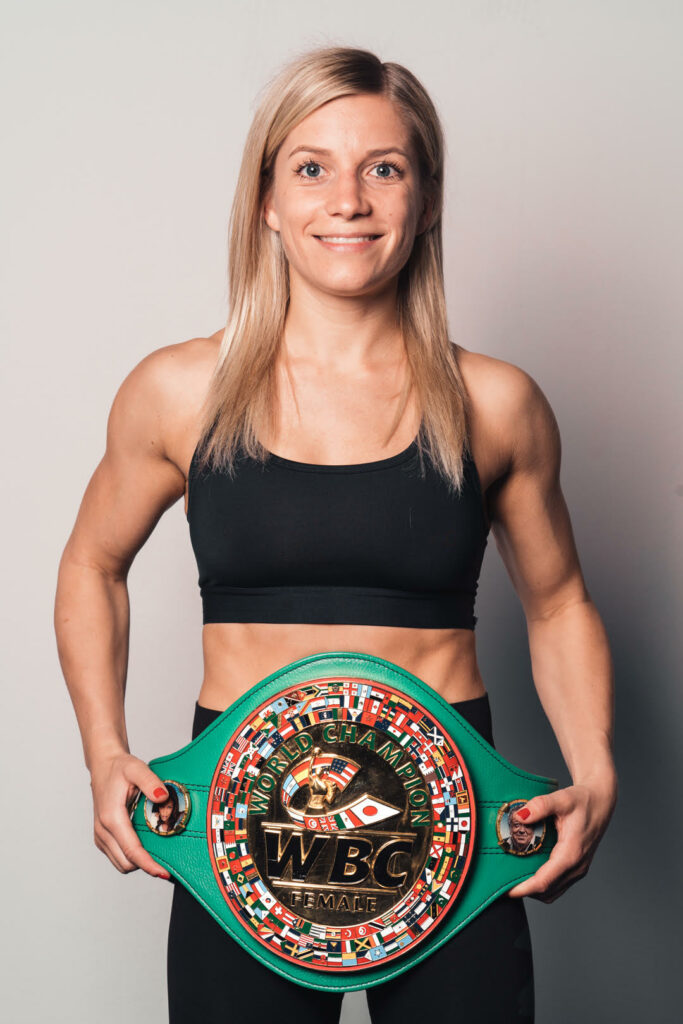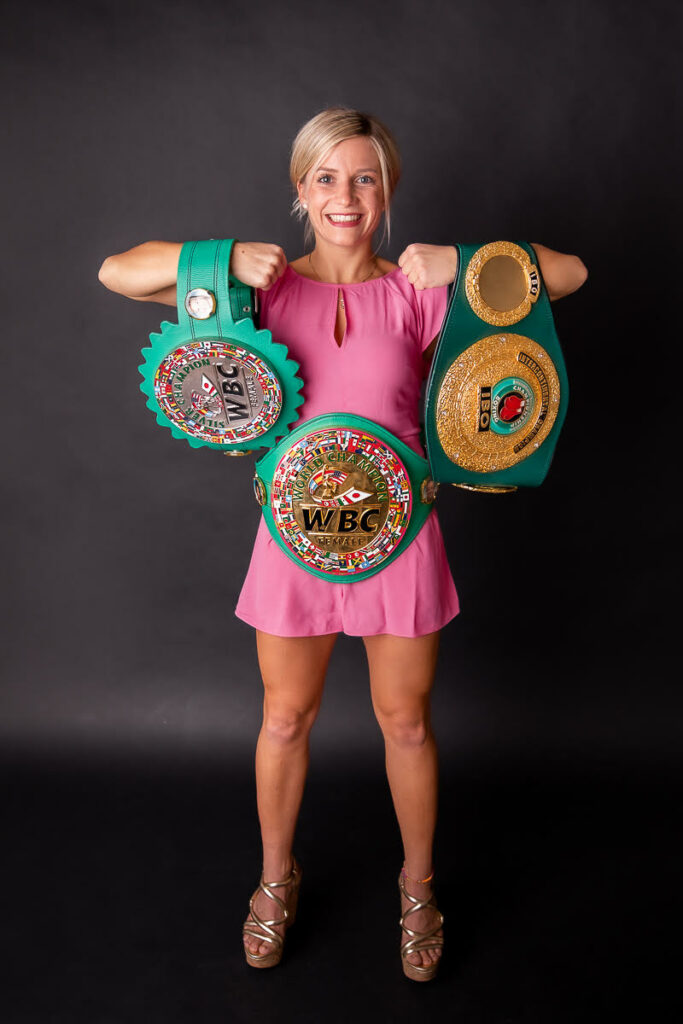For Tina Rupprecht, boxing is a labour of love. Any hopes of making money in her thus far eight-year career have long been dashed as she resigns herself to the fact that the sport will continue to cost her financially rather than solicit the keys to newfound riches. Yet her drive and enthusiasm are infectious and clear pointers to why Rupprecht (10-0-1, 3 KOs) has been so successful between the ropes, whilst lacking promotional connections and continually struggling to finance her career.
Nicknamed ‘Tiny’ Tina, the diminutive 5”0 resident of Augsburg in southern Germany has been the proud holder of a green-strapped WBC title at minimumweight since 2018. But campaigning at 105lbs in Europe is not without its challenges as the division’s elite mostly resides in Latin America or Asia. Even finding sparring partners of the requisite quality is difficult, especially when lacking the necessary funds to travel, and so Rupprecht is routinely forced to train with much heavier girls.
But for the 28-year-old, who supplements her ring career with teaching sports in schools, there is no question of not keeping going. Every challenge the sport throws at her she has demonstrated the nous and application to overcome. “I started boxing at 12,” she reminisces. “Then I just developed the dream to achieve something in the sport. I trained very hard and aged 15 I became German champion for the first time and that really was the start of everything.
“I competed for four years with the German national team. I was four times national champion, but aged 23 I changed to professional because in amateur there weren’t so many goals left for me. My weight division is not included in the Olympics, so I thought I might as well turn pro.”
You’d be forgiven for thinking that this might have been a relatively straightforward thing to do in a country that possesses a long tradition of producing top calibre boxers. From Max Schmelling to Henry Maske and Sven Ottke, whilst not forgetting the likes of Arthur Abraham and the Klitschko brothers who established their careers there. But Rupprecht reveals that the sport in Germany feels very much in decline, with limited television interest, especially when it comes to women’s boxing.
She admits to casting an envious eye on the UK where female boxing is increasingly becoming front and centre with the likes of Chantelle Cameron, Terri Harper, and Savannah Marshall leading shows and co-supporting large PPV events. “But at the same time, it is cool to see,” admits Rupprecht. “It’s great how they are doing this in the UK. Female boxing seems to be doing great and the boxers deserve that. I think Germany should take it as an example.”
For much of her career, Rupprecht has subsisted without a promoter; everything that she has achieved has really been down to her own efforts and that of her coach. Together they have not just trained for the fights and scored the victories within the ring but also done everything else in between. A hard slog of chasing fights, selling tickets, and pursuing sponsors amidst a landscape defined by indifference.
“The finances of the sport are much harder than I ever anticipated,” admits the 28-year-old. “But we have at least managed to organise my mandatory title defence [scheduled for this Saturday, July 24].” But this revealing statement is an open window into the challenges facing Rupprecht. Fighting and winning have proved to be just one side of a heavy coin that cannot be spun without the money and sponsorship first being put in place.
It is this imperative that almost cut off Rupprecht’s journey in professional boxing before it got properly started. Debuting in December 2013, she dismantled her Czech opponent in just 50 seconds of the opening round. “It was planned for four rounds,” she remembers. “But to be honest I think my opponent was a little bit afraid of me. I started with a combination and that was it; the fight was over.” Her next fight six months later followed a similar pattern with the last rites being read this time after just 79 seconds.
And that was it for two years. The WBC titlist admits that she was very close to giving it all up to travel around the world. “We were new to the business and trying to do it on our own,” she reflects. “We really had no idea about professional boxing. Because of that, it made it very difficult for us to get fights and to finance it all.
“At one point, I was very close to finishing with it all. But then my coach promised: ‘Let’s have one last try’. And he did it. One year later I became WBC Interim champion. It was a very hard beginning but we did it all ourselves and I am very proud of that.
“We have had hard times where my coach has supported me financially. He doesn’t have so much money, so I am thankful for that. But, you know, people cannot imagine. They don’t understand what pro boxing is like. They ask me: ‘Why do you have to pay for your fights?’”
Rupprecht upgraded her Interim belt with the full WBC title in December 2018 via a unanimous decision over Venezuela’s Niorkis Carreno. The German has since navigated two successful defences and is proud of her record and the quality of opposition she has faced. “I have never fought against easy opposition, always strong ones because I want to develop myself and be a real champion,” she discloses. “I do not want the title as a gift. That is important to me and makes sure that I can be very proud of what I’ve achieved.”

Photo: Tina Rupprecht.
However, this strategy did lead the 28-year-old into a hard-fought draw against Maricela Quintero in her first title defence. Of this only blip on her record, Rupprecht says: “It wasn’t my best performance. I am open to a rematch, but I would like to box other opponents in the Top 10 first.”
For Rupprecht, all focus is now on Saturday night and the Hydro-Tech Eisarena (ice skating rink) in Konigsbrunn, where she will top the bill against Mexican challenger Katia Gutierrez [23-7, 6 KOs]. The 30-fight veteran was the inaugural winner of the IBF championship belt at minimum weight in 2011, recording four successful defences, and promises to be yet another tough adversary. Rupprecht recognises that “[Guiterrez] is a very strong opponent. She is very experienced and has fought good opposition over the years.
“But I like that. We are preparing very hard for this fight, with lots of sparring; I am really looking forward to it. My fitness is really very good; it will be an exciting fight. But I won’t make a prediction. Only in the ring will we see how it is going to be.”
However, after 19 months of inactivity attributable to Covid-19, where the lack of television demand in Germany has made it impossible to stage financially viable promotions, just entering the ring must in its own way feel like an achievement. That Rupprecht has managed this without the support of a promoter must also be a source of additional pride.
Circumstances have called on the champion to explore the option of ‘Crowd funding’ in an attempt to bankroll the costs for the fight. “It’s been better than nothing,” she says of her unorthodox financing model. “I have got 1,700 Euros from it, but, you know, I need almost 30,000 Euros.
“The rest I have been able to make through my sponsors here in Germany. I am very thankful that the people around me support me. My friends, family, even people that don’t know me personally. I really am very thankful for that.”
Rupprecht refuses to look beyond Saturday’s fight – which will be live-streamed on the ‘Ab in den Ring’ YouTube page – but is determined to pursue unification fights in the near future. “I was planned to fight in Costa Rica back in January,” she recalls. “We wanted to make a unification fight with IBF champion Yokasta Valle [an opponent that Rupprecht has already bested over 10 rounds in 2018]. Unfortunately, the fight was cancelled. But I was ready to go, ready to fight outside of Germany. I am totally open for that.”
Thus far ‘Tiny’ Tina has only fought once outside of her home country, a six-round shutout in Russia early on in her career. Yet she declares a readiness to travel to Japan or America if it can secure her a unification fight with either WBO titlist Etsuko Tada or WBA queen Seneisa Estrada [owner of the viral seven-second knockout over a hideously overmatched Miranda Adkins].
It would be easy for Rupprecht to look upon Estrada with envy when one considers how the 29-year-old nicknamed ‘Super Bad’ has fought on a Canelo undercard at the MGM Grand, whereas the German is more used to gymnasiums and small local halls. However, Rupprecht just wants the opportunity to test herself against the best.
“Estrada has a big promoter in Golden Boy and is competing in a country where there is media interest. I just don’t have that where I live. It’s very sad because in Germany we train so hard, but we just don’t get the level of interest,” she remarked.
“Maybe going there would make it more difficult for me to win, but everything around it would be much easier,” she says in a nod to her constant financial challenges. A high-profile away show would be manna from heaven as it would for once alleviate all of her many out-of-the-ring responsibilities and allow her to just train, turn up and fight.
At the end of the day, that is all Tina Rupprecht craves the opportunity to do.

Photo: Tina Rupprecht.
Main image and all photos: Courtesy of Tina Rupprecht.
